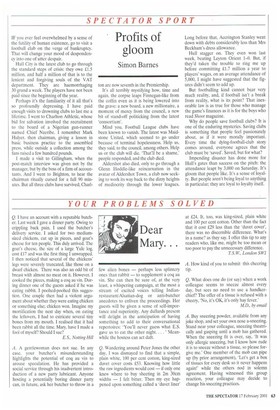• Profits of gloom
Simon Barnes
IF you ever feel overwhelmed by a sense of the futility of human existence, go to visit a football club on the verge of bankruptcy. That will change your mood of despondency into one of utter despair.
Hull City is the latest club to go through the standard steps of crisis: they owe £1.5 million, and half a million of that is to the lenient and forgiving souls of the VAT department. They are haemorrhaging 30 grand a week. The players have not been paid since the beginning of the year.
Perhaps it's the familiarity of it all that's so profoundly depressing. I have paid enough visits to drowning clubs to last me a lifetime. I went to Charlton Athletic, whose bid for salvation involved the recruitment to the board of a Nigerian gun-runner named Chief Nzeribe. I remember Mark Hulyer, then chairman, giving a lesson in basic business practice to the assembled press, while outside a collection among the fans raised a few hundred pounds.
I made a visit to Gillingham, when the post-match interview was given not by the manager, but by the boss of a firm of accountants. And I went to Brighton, to hear the chairman ritually cursed for a full 90 mMutes. But all three clubs have survived; Charl ton are now seventh in the Premiership.
It's all terribly mystifying how, time and again, the corpse leaps Finnegan-like from the coffin even as it is being lowered into the grave: a new board, a new millionaire, a moment of mercy from the council, a new bit of stand-off politicking from the latest 'consortium'.
Mind you, Football League clubs have been known to vanish. The latest was Maidstone United, which seemed to go under because of terminal hopelessness. Help us, they said, to the council, among others. Help us or the club will die. 'That'll be a shame,' people responded, and the club died.
Aldershot also died, only to go through a Glenn Hoddle-like reincarnation in the avatar of Aldershot Town, a club now seeking to work its way back to the dizzy heights of mediocrity through the lower leagues. Long before that, Accrington Stanley went down with debts considerably less than Mrs Beckham's dress allowance.
Hull stagger on. They even won last week, beating Leyton Orient 1-0. But, if they'd taken the trouble to ring me up before committing £1.7 million a year to players' wages, on an average attendance of 5,000, I might have suggested that the figures didn't seem to add up.
But footballing kind cannot bear very much reality, and, if football isn't a break from reality, what is its point? That inexorable law is as true for those who manage the game's finances as it is for the boys who read Shoot magazine.
Why do people save football clubs? It is one of the enduring mysteries. Saving clubs is something that people feel passionately about, as if it were morally important. Every time the dying-football-club story comes around, everyone agrees that the club must be 'saved'. Saved; but for what?
Impending disaster has done more for Hull's gates than success on the pitch; the attendance leapt by 3,000 on Saturday. It's gloom that people like. It's a sense of loyalty. But people aren't being loyal to anything in particular; they are loyal to loyalty itself.


































































 Previous page
Previous page